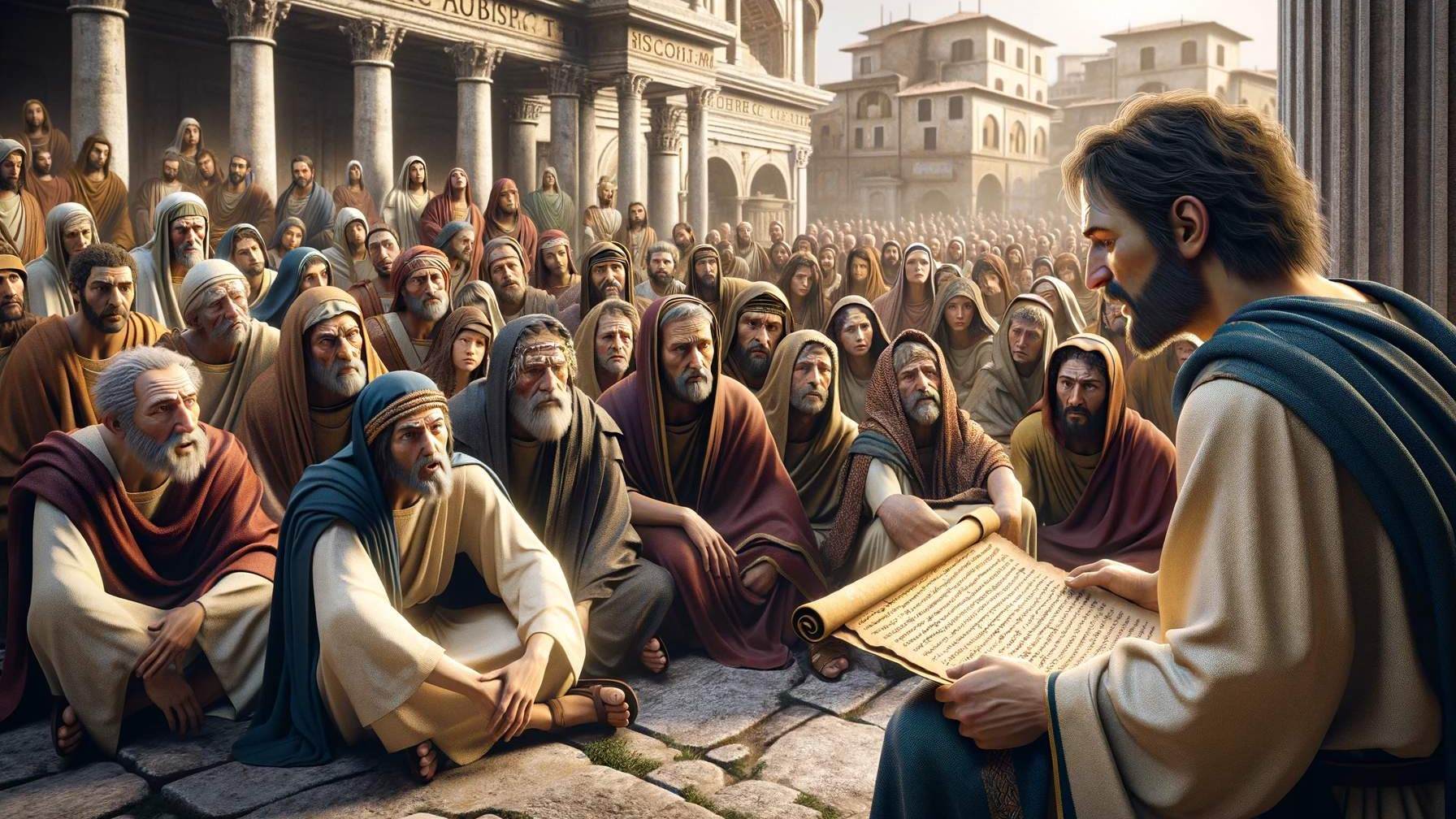Home>Bible Facts>How To Understand The Book Of Revelation


Bible Facts
How To Understand The Book Of Revelation
Published: February 11, 2024
Jason DeRose, Managing Editor at Christian.net, uses his expertise in religion and journalism to deepen understanding of faith's societal impacts. His editorial leadership, coupled with a strong academic background, enriches the platform’s diverse content, earning him recognition in both journalism and religious circles.
Learn the key Bible facts and gain a deeper understanding of the Book of Revelation with our comprehensive guide. Unlock the mysteries of this important biblical text today!
(Many of the links in this article redirect to a specific reviewed product. Your purchase of these products through affiliate links helps to generate commission for Christian.net, at no extra cost. Learn more)
Table of Contents
Introduction
The Book of Revelation, also known as the Apocalypse, is the final book of the New Testament and holds a unique place in the Bible. It is a captivating and enigmatic work that has sparked curiosity, debate, and fascination for centuries. Written by the apostle John while exiled on the island of Patmos, this book offers a glimpse into the divine mysteries of the future and the ultimate triumph of good over evil.
Revelation is a complex and multifaceted text that encompasses apocalyptic visions, prophetic messages, and symbolic imagery. Its profound and often cryptic nature has led to a wide array of interpretations, making it both intriguing and challenging to understand. Despite its complexities, the Book of Revelation carries profound significance for Christians and offers timeless lessons that resonate across generations.
As we embark on a journey to explore the depths of Revelation, it is essential to approach this book with an open mind and a willingness to delve into its rich symbolism and profound truths. By gaining a deeper understanding of its historical context, literary style, key themes, and practical applications, we can unravel the timeless wisdom contained within its pages and glean valuable insights for our lives today.
In the following sections, we will delve into the historical context of the Book of Revelation, explore its literary style and symbolism, uncover its key themes and messages, and discuss practical ways to apply its teachings in our modern world. Through this exploration, we aim to shed light on the profound significance of Revelation and equip readers with a deeper understanding of this remarkable biblical text.
Historical Context of the Book of Revelation
The historical context of the Book of Revelation provides crucial insights into its composition and intended audience. Believed to have been written by the apostle John during his exile on the island of Patmos around 95 AD, Revelation emerged during a period of intense persecution of early Christians under the Roman Empire. The author, addressing seven churches in Asia Minor, sought to offer them encouragement, exhortation, and a prophetic vision of hope amidst their tribulations.
During this time, Emperor Domitian's oppressive reign posed a significant threat to the Christian community. The emperor demanded absolute allegiance and reverence, leading to widespread persecution of those who refused to worship him as divine. In this hostile environment, Christians faced severe persecution, imprisonment, and even martyrdom for their faith. The Book of Revelation, therefore, served as a source of comfort and reassurance for these beleaguered believers, offering them a vision of divine justice and the ultimate triumph of good over evil.
The apocalyptic imagery and vivid symbolism employed in Revelation were not only a means of conveying profound spiritual truths but also a form of coded communication that provided solace and encouragement to the persecuted Christians. By depicting the cosmic conflict between the forces of good and evil and the ultimate victory of Christ, the book offered a powerful message of hope and perseverance in the face of adversity.
Furthermore, the historical context of Revelation underscores the significance of its message for both its original audience and contemporary readers. By understanding the challenges and tribulations faced by the early Christian community, we can appreciate the enduring relevance of Revelation's themes of faithfulness, endurance, and the ultimate triumph of God's kingdom. This historical backdrop serves as a poignant reminder of the enduring nature of the human struggle against oppression and the timeless hope found in the promises of God.
In essence, the historical context of the Book of Revelation provides a compelling backdrop for understanding its profound message of hope, perseverance, and divine sovereignty in the face of adversity. It serves as a testament to the enduring relevance of its themes and offers invaluable insights into the challenges faced by early Christians, resonating with the struggles and triumphs of believers throughout history.
Literary Style and Symbolism in the Book of Revelation
The Book of Revelation is renowned for its distinctive literary style and rich symbolism, which contribute to its enigmatic and captivating nature. The author, the apostle John, employs a unique blend of apocalyptic, prophetic, and visionary elements to convey profound spiritual truths and offer a glimpse into the cosmic battle between good and evil. The literary style of Revelation is characterized by its vivid imagery, symbolic language, and dramatic narrative, creating a compelling tapestry of divine revelation and spiritual insight.
One of the defining features of Revelation's literary style is its abundant use of symbolism. Throughout the book, symbolic imagery permeates the prophetic visions, serving as a means of conveying profound spiritual truths and cosmic realities. The use of symbols such as the seven seals, seven trumpets, and seven bowls, along with vivid depictions of heavenly beings and celestial phenomena, adds layers of meaning and depth to the text. These symbols are not merely decorative elements but are integral to the book's message, inviting readers to discern their deeper significance and uncover the timeless truths they represent.
Moreover, the apocalyptic literary style of Revelation is marked by its dramatic and visionary narrative, characterized by vivid and often surreal descriptions of heavenly realms, divine judgments, and eschatological events. The use of dramatic imagery, such as the woman clothed with the sun, the great red dragon, and the beast with ten horns, creates a sense of awe and wonder, drawing readers into the otherworldly dimensions of the prophetic visions. This visionary style serves to evoke a sense of urgency and anticipation, compelling readers to contemplate the profound mysteries and spiritual realities unveiled in the text.
Furthermore, the literary style of Revelation incorporates elements of Old Testament prophecy, drawing upon the rich tradition of Hebrew apocalyptic literature. The use of symbolic numbers, allegorical figures, and prophetic pronouncements reflects the influence of Old Testament prophetic writings, infusing Revelation with a sense of continuity with the prophetic tradition while also presenting a distinct and visionary perspective on the culmination of God's redemptive purposes.
In essence, the literary style and symbolism in the Book of Revelation contribute to its enduring fascination and spiritual depth. Through its rich tapestry of symbolic imagery, visionary narrative, and prophetic pronouncements, Revelation invites readers to embark on a journey of spiritual discovery and contemplation, offering profound insights into the cosmic drama of redemption and the ultimate triumph of God's kingdom.
Key Themes and Messages in the Book of Revelation
The Book of Revelation encompasses a rich tapestry of key themes and profound messages that resonate throughout its visionary narrative. At its core, Revelation serves as a powerful testament to the sovereignty of God, the ultimate triumph of good over evil, and the fulfillment of divine promises. Among the key themes and messages woven into the fabric of Revelation, several stand out as central to its overarching message.
1. Divine Sovereignty and Victory
Revelation vividly portrays the cosmic conflict between the forces of good and evil, ultimately culminating in the triumph of God's kingdom. Through apocalyptic imagery and symbolic visions, the book conveys the absolute sovereignty of God over all creation and the assurance of His final victory over the powers of darkness. This theme serves as a source of hope and encouragement, reminding believers of the ultimate triumph of God's redemptive purposes and the establishment of His eternal kingdom.
2. Perseverance and Endurance
Amidst the trials and tribulations faced by the early Christian community, Revelation offers a resounding message of perseverance and endurance. The exhortation to remain faithful in the face of persecution and to endure hardships with steadfast resolve permeates the book, serving as a timeless reminder of the strength found in unwavering faith and perseverance in the midst of adversity.
3. Eschatological Hope and Redemption
Revelation unfolds a vision of eschatological hope, depicting the consummation of God's redemptive plan and the renewal of all creation. The promise of a new heaven and a new earth, the defeat of evil, and the eternal reign of Christ as the triumphant King form a central theme that inspires hope and anticipation for the ultimate fulfillment of God's redemptive purposes.
4. Cosmic Conflict and Spiritual Realities
The book delves into the cosmic dimensions of spiritual warfare, portraying the ongoing conflict between the forces of light and darkness. Through vivid symbolism and prophetic imagery, Revelation unveils the unseen spiritual realities at play, emphasizing the significance of spiritual discernment and the need for vigilance in the face of spiritual opposition.
5. Call to Holiness and Faithfulness
Revelation issues a compelling call to holiness and faithfulness, urging believers to remain steadfast in their commitment to God and to live lives marked by moral integrity and spiritual devotion. The exhortation to overcome spiritual compromise and to embrace a life of faithfulness resonates as a timeless imperative for believers in every generation.
In essence, the key themes and messages in the Book of Revelation converge to offer a profound vision of divine sovereignty, eschatological hope, and the enduring call to faithfulness and perseverance amidst adversity. This multifaceted tapestry of themes serves to inspire, encourage, and challenge believers to embrace the enduring truths and transformative power of Revelation's timeless message.
Read more: Who Is The Woman In Book Of Revelation
Interpreting the Book of Revelation
Interpreting the Book of Revelation requires a thoughtful and discerning approach that acknowledges its complex and multifaceted nature. As one of the most enigmatic and symbol-laden books in the Bible, Revelation has given rise to diverse interpretations and theological perspectives throughout history. When seeking to unravel its profound message, several key principles and approaches can guide readers in navigating the intricate tapestry of its apocalyptic visions and prophetic imagery.
-
Historical Context and Symbolic Language: Understanding the historical context in which Revelation was written is essential for interpreting its symbolic language and imagery. The book's vivid symbolism often draws upon contemporary events, cultural references, and Old Testament motifs, underscoring the need to discern the symbolic significance within its historical framework.
-
Literary Genre and Apocalyptic Tradition: Recognizing Revelation's place within the apocalyptic literary tradition is crucial for interpretation. The book's visionary narrative, symbolic numbers, and cosmic imagery align it with the genre of apocalyptic literature, characterized by its use of symbols, visions, and eschatological themes. Interpreting Revelation within the context of this literary tradition provides valuable insights into its intended meaning.
-
Multiple Layers of Meaning: Revelation operates on multiple layers of meaning, encompassing historical, spiritual, and eschatological dimensions. Its prophecies and visions often convey truths that transcend specific historical events, offering timeless insights into the ongoing spiritual conflict and the ultimate fulfillment of God's redemptive plan.
-
Symbolic Interpretation and Theological Reflection: Engaging in symbolic interpretation and theological reflection is essential for discerning the deeper significance of Revelation's imagery and prophetic messages. The book's symbols and visions invite readers to contemplate their theological implications and spiritual truths, prompting a deeper exploration of their symbolic and allegorical meanings.
-
Christocentric Focus: Maintaining a Christocentric focus is fundamental to interpreting Revelation's message. The book centers on the exalted Christ as the victorious Lamb, the Alpha and the Omega, and the ultimate conqueror of evil. Interpreting Revelation through the lens of Christ's redemptive work and divine sovereignty illuminates its central themes and theological significance.
In essence, interpreting the Book of Revelation demands a nuanced and holistic approach that integrates historical context, literary genre, symbolic interpretation, and theological reflection. By embracing these principles, readers can embark on a journey of discovery, discernment, and spiritual insight, unraveling the timeless truths and transformative power embedded within the enigmatic visions of Revelation.
Practical Application of the Book of Revelation in Today's World
The profound and timeless message of the Book of Revelation extends far beyond its historical context, offering invaluable insights and practical applications for believers in today's world. While the apocalyptic visions and symbolic imagery may seem distant from modern-day realities, the enduring themes and messages contained within Revelation hold significant relevance for navigating the challenges and complexities of contemporary life.
1. Hope Amidst Adversity
In a world marked by uncertainty, turmoil, and moral upheaval, the Book of Revelation serves as a beacon of hope and assurance. Its portrayal of God's ultimate sovereignty and the triumph of good over evil offers solace and encouragement to believers facing adversity. By embracing the hope-filled vision of Revelation, individuals can find strength and resilience in the face of personal, societal, and global challenges, anchoring their faith in the assurance of God's ultimate victory.
2. Perseverance and Endurance
The call to perseverance and endurance resonates deeply in today's world, where believers confront various forms of opposition, persecution, and spiritual warfare. Revelation's exhortation to remain faithful amidst trials and tribulations serves as a timeless reminder of the enduring strength found in unwavering faith. By drawing inspiration from the perseverance exemplified in Revelation, individuals can navigate adversity with steadfast resolve, trusting in the sustaining power of God's grace.
Read more: How Many Chapters In Book Of Revelation
3. Discernment and Spiritual Vigilance
The cosmic conflict depicted in Revelation underscores the importance of spiritual discernment and vigilance in the face of pervasive moral and spiritual challenges. In a world characterized by moral relativism and spiritual apathy, the book's emphasis on discerning the signs of the times and remaining steadfast in faith offers a compelling call to spiritual vigilance. By heeding the warnings and exhortations of Revelation, believers can cultivate a discerning spirit and unwavering commitment to truth in the midst of cultural and ethical complexities.
4. Embracing Holiness and Faithfulness
Revelation's call to holiness and faithfulness remains profoundly relevant in a world marked by moral compromise and spiritual complacency. The book's uncompromising stance on moral integrity and unwavering devotion to God serves as a clarion call for believers to embrace lives marked by righteousness and faithfulness. By embodying the virtues of holiness and faithfulness espoused in Revelation, individuals can bear witness to the transformative power of God's truth and righteousness in a world hungering for authentic faith and moral clarity.
In essence, the practical application of the Book of Revelation in today's world transcends its apocalyptic imagery and prophetic visions, offering timeless principles and transformative insights for navigating the complexities of contemporary life. By embracing the enduring themes of hope, perseverance, discernment, and faithfulness embedded within Revelation, believers can draw strength, wisdom, and spiritual fortitude to navigate the challenges and uncertainties of the modern age.
Conclusion
In conclusion, the Book of Revelation stands as a testament to the enduring power of divine revelation and the timeless relevance of its profound message. Through its rich tapestry of historical context, literary style, key themes, and practical applications, Revelation offers a compelling vision of hope, perseverance, and ultimate triumph in the face of adversity. The historical backdrop of persecution and tribulation provides a poignant lens through which to understand the enduring significance of Revelation's themes of divine sovereignty, eschatological hope, and the call to faithfulness amidst trials.
The literary style and symbolism employed in Revelation create a captivating narrative that invites readers to embark on a journey of spiritual discovery and contemplation. Its vivid imagery, prophetic visions, and symbolic language serve as a gateway to profound spiritual truths, prompting reflection on the cosmic conflict between good and evil and the ultimate victory of God's kingdom. The book's key themes of divine sovereignty, perseverance, eschatological hope, cosmic conflict, and faithfulness resonate as timeless imperatives that transcend the boundaries of time and culture.
Interpreting the Book of Revelation demands a nuanced and discerning approach that integrates historical context, literary genre, symbolic interpretation, and theological reflection. By embracing these principles, readers can unravel the timeless truths and transformative power embedded within the enigmatic visions of Revelation, gaining valuable insights into the ongoing spiritual conflict and the ultimate fulfillment of God's redemptive plan.
Moreover, the practical application of Revelation's message in today's world offers invaluable guidance for navigating the complexities and challenges of contemporary life. Its themes of hope, perseverance, discernment, and faithfulness provide a source of strength, wisdom, and spiritual fortitude for believers facing the uncertainties and moral complexities of the modern age.
In essence, the Book of Revelation continues to captivate and inspire readers with its profound vision of divine sovereignty, eschatological hope, and the enduring call to faithfulness amidst adversity. Its timeless message transcends the boundaries of history and culture, offering enduring truths and transformative insights that resonate across generations. As we reflect on the profound significance of Revelation, may its enduring message of hope, perseverance, and divine triumph continue to inspire and uplift believers in every age.












